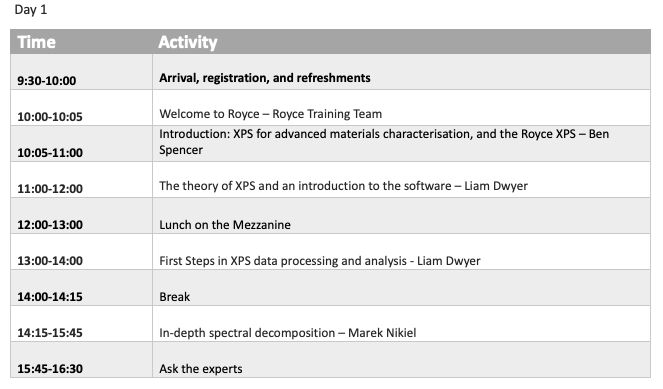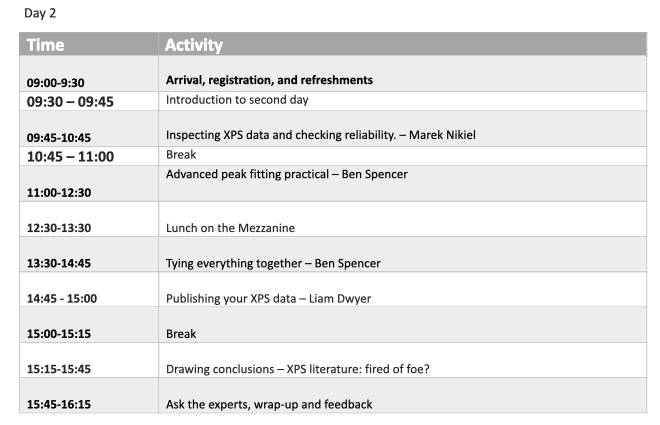Overview
This workshop aims to bring together the local XPS user community to learn how to begin analysing XPS data. Through the demonstration of basic analysis principles, working with training datasets, and user-submitted examples, the content will help users of the university’s XPS facilities develop understanding of best practice approaches to exploring their own data.
Members of the XPS technical team will lead sessions that detail example data measured in the facility, explain the physics required to constrain the analysis parameters as they arise, and explore the aims of research experiments to add context to the analysis.
Attending this course will cost £40.
Background and Motivation
XPS provides quantified elemental and chemical state (atomic bonding) information from the surface and is used ubiquitously across advanced materials research. However, analysis of XPS data can be complex, often requiring detailed knowledge of the physical processes taking place to correctly interpret findings. The event aims to assist instrument users in understanding how to best approach their own data through shared examples and investigation.
Audience
The workshop is aimed at University of Manchester PhD students, technical and research staff who are making use of the XPS facilities on campus to generate data in support of their research.
Workshop participants will need to bring their own laptop to fully participate in the workshop. A list of software and data required for the practical will be provided after registering.
Participants should already have access to their own XPS data, or be close to generating data with the XPS facilities on campus.
Aims
- Introduce the X-ray photoemission process and the physical basis of where XPS data comes from.
- Introduce the different variations of XPS as a technique and outline the breadth of facilities available to attendees.
- Introduce how to interpret spectra, including initial processing and learning how to recognise what good data looks like.
- Provide practical experience of processing and deconvoluting XPS data on a wide variety of datasets.
Learning Outcomes
- An appreciation of what information XPS can provide, its limitations, and how the different variations of the technique could be used to answer different questions.
- An understanding of the fundamental physics involved in the photoemission process, which then informs appropriate decomposition of XP spectra (particularly, constraints).
- An understanding of how to use CasaXPS to process, quantify, peak fit, and export XPS data.
- An understanding of the challenges in decomposing spectra and how that might impact the conclusions drawn from the analysis.
- An understanding of where to find reliable data when processing XPS data, and insight into the variable accuracy of XPS interpretation in the wider literature.
Programme


Organisers
- Andrea Izquierdo- Royce
- Ben Spencer– The University of Manchester
- Marek Nikiel – The University of Manchester
- Liam Dwyer – The University of Manchester
February 6 2025



